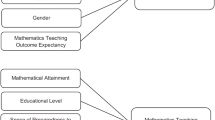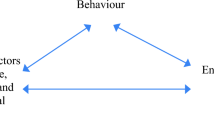Abstract
This study investigated Turkish preservice, elementary teachers’ personal mathematics teaching efficacy (PMTE), and science teaching efficacy (PSTE) beliefs at the end of their teacher education program. A majority of the participants believed they were well prepared to teach both elementary mathematics and science, but their PSTE scores were significantly lower than their PMTE scores. However, a significant correlation was found between the PMTE and PSTE scores. No significant gender effect on PMTE and PSTE scores was observed, but unlike the results from other countries, Turkish female preservice elementary teachers were found to have slightly higher PMTE and PSTE scores than their male peers. High school major area was found to be a significant predictor of participants’ PMTE and PSTE scores. Participants with mathematics/science high school majors were found to have significantly higher PMTE and PSTE scores than those with other high school majors.
Similar content being viewed by others
References
Ashton, P. T., & Webb, R. B. (1986). Making a difference: Teachers’ sense of efficacy and student achievement. White Plains: Longman.
Bandura, A. (1977). Self-efficacy: Toward a unifying theory of behavioral change. Psychological Review, 84, 191–215.
Bandura, A. (1997). Self-efficacy: The exercise of control. New York: Freeman.
Battista, M. T. (1986). The relationship of mathematics anxiety and mathematical knowledge to the learning of mathematical pedagogy by pre-service elementary teachers. School Science and Mathematics, 86, 10–19.
Bauer, S. M., & Toms, K. (1990, February). Science in the elementary schools: Teachers’ perceptions of test-mandated curriculum reform. Paper presented at the annual meeting of the Eastern Education Research Association, Boston, MA.
Bleicher, R. E., & Lindgren, J. (2009). Variable relationships among different science learners in elementary science-methods courses. International Journal of Science and Mathematics Education, 7, 293–313.
Briscoe, C., & Stout, D. (2001). Prospective elementary teachers’ use of mathematical reasoning in solving a lever mechanics problem. School Science and Mathematics, 101, 228–235.
Brownlow, S., Jacobi, T., & Rogers, M. (2000). Science anxiety as a function of gender and experience. Sex Roles: A Journal of Research, 42, 119–31.
Cakiroglu, J., Cakiroglu, E., & Boone, W. (2005). Pre-service teacher self-efficacy beliefs regarding science teaching: A comparison of pre-service teachers in Turkey and the USA. Science Educator, 14, 31–40.
Cantrell, P., Young, S., & Moore, A. (2003). Factors affecting science teaching efficacy of preservice elementary teachers. Journal of Science Teacher Education, 14, 177–92.
Chin, C. (2005). First-year pre-service teachers in Taiwan: Do they enter the teacher program with satisfactory scientific literacy and attitudes toward science? International Journal of Science Education, 27, 1549–1570.
Cox, C., & Carpenter, J. (1989). Improving attitudes toward teaching science and reducing science anxiety through increasing confidence in science ability in inservice elementary school teachers. Journal of Elementary Science Education, 1, 14–34.
Downing, J. E., Filer, J. D., & Chamberlain, R. A. (1997, November). Science process skills and attitudes of preservice elementary teachers. Paper presented at the annual meeting of the Mid-South Educational Research Association, Memphis, TN. (ERIC Document Reproduction Service No. ED416191)
Enochs, L. G., & Riggs, I. M. (1990). Further development of an elementary science teaching efficacy instrument: A preservice elementary scale. School Science and Mathematics, 90, 694–706.
Enochs, L. G., Smith, P. L., & Huinker, D. (2000). Establishing factorial validity of the mathematics teaching efficacy beliefs instrument. School Science and Mathematics, 100, 194–202.
Feistritzer, E. C., & Boyer, E. L. (1983). The conditions of teaching: A state-by-state analysis. Princeton: The Carnegie Foundation for the Advancement of Teaching.
Gencer, A. S., & Cakiroglu, J. (2007). Turkish preservice science teachers’ efficacy beliefs regarding science teaching and their beliefs about classroom management. Teaching and Teacher Education, 23, 664–75.
Goodchild, S., & Grevholm, B. (2009). An exploratory study of mathematics test results: What is the gender effect? International Journal of Science and Mathematics Education, 7, 161–82.
Graeber, A., Tirosh, D., & Glover, R. (1989). Pre-service teachers’ misconceptions in solving verbal problems in multiplication and division. Journal for Research in Mathematics Education, 20, 95–102.
Hadfield, O. D., Littleton, C. E., Steiner, R. L., & Woods, E. S. (1998). Predictors of preservice elementary teacher effectiveness in the micro-teaching of mathematics lessons. Journal of Instructional Psychology, 25, 34–47.
Harper, N. W., & Daane, C. J. (1998). Causes and reductions of math anxiety in pre-service elementary teachers. Action in Teacher Education, 19, 29–38.
Ho, H., Senturk, D., Lam, A. G., Zimmer, J. M., Hong, S., Okamoto, Y., et al. (2000). The affective and cognitive dimensions of math anxiety: A cross-national study. Journal for Research in Mathematics Education, 31, 362–79.
Isiksal, M. (2005). Pre-service teachers’ performance in their university coursework and mathematical self-efficacy beliefs: What is the role of gender and year in program? The Mathematics Educator, 15, 8–16.
Isiksal, M., & Cakiroglu, E. (2005). Teacher efficacy and academic performance. Academic Exchange Quarterly, 9, 28–33.
Manning, P. C., Esler, W. K., & Baird, J. R. (1982). How much elementary science is really being taught? Science and Children, 19, 40–41.
Marshall, J. C., Horton, R., Igo, B. L., & Switzer, D. M. (2009). K-12 science and mathematics teachers’ beliefs about and use of inquiry in the classroom. International Journal of Science and Mathematics Education, 7, 575–96.
Milli Eğitim Bakanlığı [Ministry of National Education of Turkey]. (2007). High school lesson schedules. Retrieved November 13, 2007, from http://ogm.meb.gov.tr/ [in Turkish]
Moore, J. J., & Watson, S. B. (1999). Contributors to the decision of elementary education majors to choose science as an academic concentration. Journal of Elementary Science Education, 11, 37–46.
Mulholland, J., Dorman, J. P., & Odgers, B. M. (2004). Assessment of science teaching efficacy of preservice teachers in an Australian university. Journal of Science Teacher Education, 15, 313–31.
Palmer, D. H. (2006). Durability of changes in self-efficacy of preservice primary teachers. International Journal of Science Education, 28, 655–71.
Putney, L. D., & Cass, M. (1998). Preservice teacher attitudes toward mathematics improvement through a manipulative approach. College Student Journal, 32, 626–32.
Quinn, R. J. (1997). Effects of mathematics methods courses on the attitudes and content knowledge of pre-service teachers. Journal of Educational Research, 91, 108–113.
Ramey-Gassert, L., & Shroyer, M. G. (1992). Enhancing science teaching self-efficacy in preservice elementary teachers. Journal of Elementary Science Education, 4, 26–34.
Riggs, I. M. (1991). Gender differences in elementary science teacher self-efficacy. Paper presented at the annual meeting of the American Educational Research Association, Chicago, IL.
Rule, A. C., & Harrell, M. H. (2006). Symbolic drawings reveal changes in preservice teacher mathematics attitudes after a mathematics methods course. School Science and Mathematics, 106, 241–58.
Sarikaya, H., Cakiroglu, J., & Tekkaya, C. (2005). Self-efficacy, attitude and science knowledge. Academic Exchange Quarterly, 9, 38–43.
Sherwood, R. D., & Westerback, M. E. (1983). A factor analytic study of the state-trait anxiety inventory utilized with pre-service elementary teachers. Journal of Research in Science Teaching, 20, 225–229.
Stepans, J., & McCormack, A. (1985). A study of scientific conceptions and attitudes toward science of prospective elementary teachers: A research report. (ERIC Document Reproduction Service No. ED266024)
Stevens, C., & Wenner, G. (1996). Elementary pre-service teachers’ knowledge and beliefs regarding science and mathematics. School Science and Mathematics, 96, 2–9.
Swars, S. L., Daane, C. J., & Giesen, J. (2006). Mathematics anxiety and mathematics teacher efficacy: What is the relationship in elementary preservice teachers? School Science and Mathematics, 106, 306–15.
Tekkaya, C., Cakiroglu, J., & Ozkan, O. (2004). Turkish pre-service science teachers’ understanding of science and their confidence in teaching it. Journal of Education for Teaching, 30, 57–66.
Thipkong, S., & Davis, E. (1991). Pre-service elementary teachers’ misconceptions in interpreting and applying decimals. School Science and Mathematics, 91, 93–99.
Tooke, D. J., & Lindstrom, L. C. (1998). Effectiveness of a mathematics methods course in reducing math anxiety of pre-service elementary teachers. School Science and Mathematics, 98, 136–39.
Tosun, T. (2000). The beliefs of pre-service elementary teachers toward science and science teaching. School Science and Mathematics, 100, 374–379.
Utley, J., Moseley, C., & Bryant, R. (2005). Relationship between science and mathematics teaching efficacy of preservice elementary teachers. School Science and Mathematics, 105, 82–88.
Wenner, G. J. (1993). Relationship between science knowledge levels and beliefs toward science instruction held by pre-service elementary teachers. Journal of Science Education and Technology, 2, 461–468.
Westerback, M. E. (1982). Studies on attitude toward teaching science and anxiety about teaching science in pre-service elementary teachers. Journal of Research in Science Teaching, 19, 603–616.
Young, B. J., & Kellogg, T. (1993). Science attitudes and preparation of pre-service elementary teachers. Science Education, 77, 279–291.
Yüksek Öğretim Kurulu [Higher Education Council of Turkey]. (1998). Teacher preparation. Retrieved May 5, 2007, from http://www.yok.gov.tr/content/view/16/52/ [in Turkish]
Zettle, R. D., & Raines, S. J. (2000). The relationship of trait and test anxiety with mathematics anxiety. College Student Journal, 34, 246–258.
Author information
Authors and Affiliations
Corresponding author
Rights and permissions
About this article
Cite this article
Bursal, M. TURKISH PRESERVICE ELEMENTARY TEACHERS’ SELF-EFFICACY BELIEFS REGARDING MATHEMATICS AND SCIENCE TEACHING. Int J of Sci and Math Educ 8, 649–666 (2010). https://doi.org/10.1007/s10763-009-9179-6
Received:
Accepted:
Published:
Issue Date:
DOI: https://doi.org/10.1007/s10763-009-9179-6




